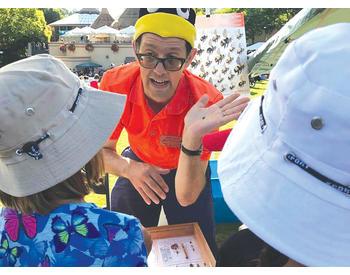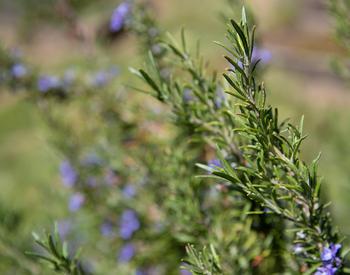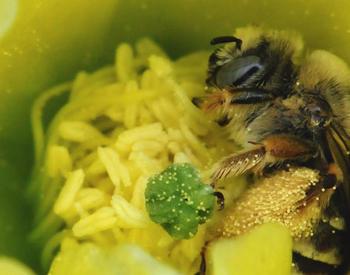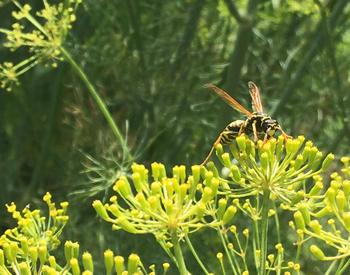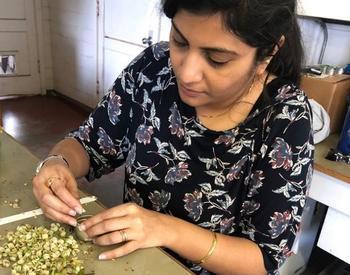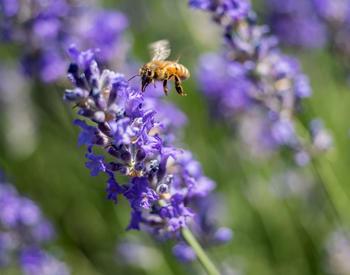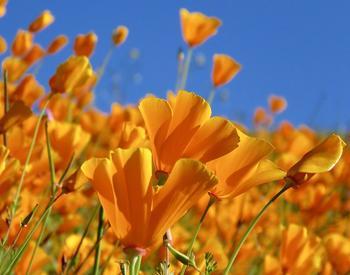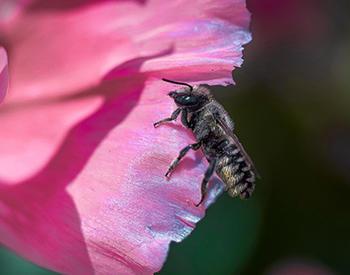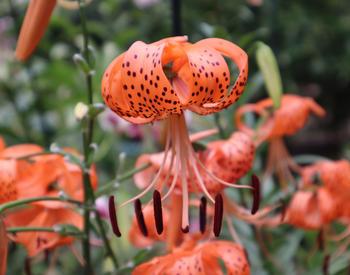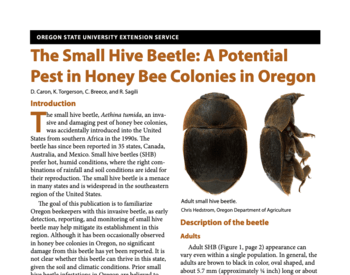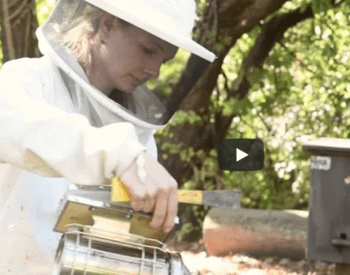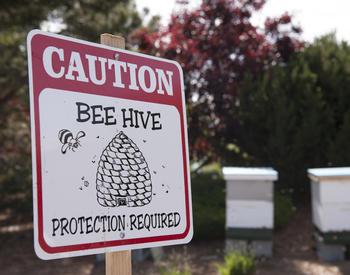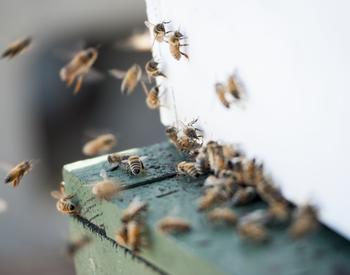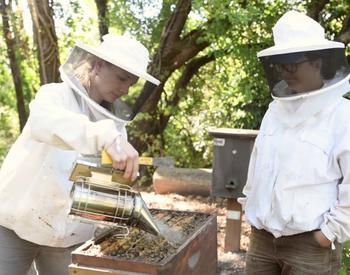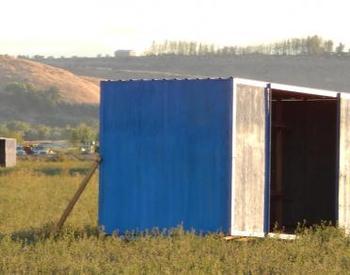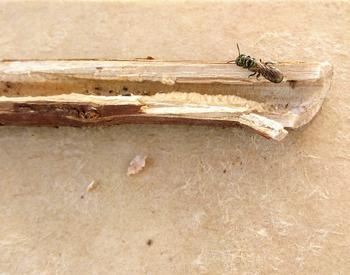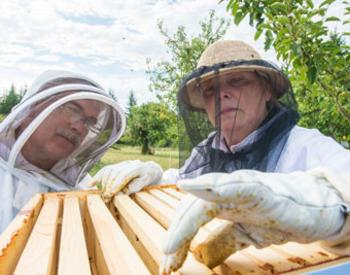Transcript
Speaker 1
From the Oregon State University Extension Service, this is pollination, a podcast that tells the stories of researchers, land managers and concerned citizens making bold strides to improve the health of pollinators. I'm your host. Doctor Adoni Melitopol, this assistant professor in pollinator health in the Department of Horticulture. Wow, I was at the biggest beekeeping meeting I've ever been to in my life. The World Congress of Beekeeping, APA Mundia, which was held in early September in Montreal, Canada, and I've got a bunch of podcasts that I recorded at that meeting, including interview on risk assessment. Nigel Raine, with Mail Montreal Greg from Mail Montreal. But I've got two episodes that I want to share with you. The first one here is on some of the vendors at Apimondia. Apimondia has this huge trade show called API Expo. So, in this episode we're just going to wander through the aisles and I'm gonna bring you some really interesting conversations from Chile to South Korea to Quebec, Canada. We're going to hear about some of the latest and greatest innovations in beekeeping technology this week on pollination. Even before I got into the trade show, the first person I ran into was a familiar face. Dan from the BC Honey Producers Association. There's a lot of booths from different associations at the meeting, so here's what Dan had to say. Just kind of like at the front end of April, money of the total excitement and you can hear the roar of people in the background.
Speaker 2
Hi, I'm Dan Lawson. I'm from the BC Honey Producers Association. Sit on the executive and actually helped with the trade show present our trade show display here at the AP Expo that we're having on.
Speaker 1
Today. So, tell us what's at if you went to the BC Honey Producers Association booth, what would people see there?
Speaker 2
Well, we're just kind of showcasing not only our association but ours. As well, as our province, beekeeper. So, we've got some banners, some videos, some printed material and just kind of talking up what we did in BC and giving out some information.
Speaker 1
And some issues of BC, yes.
Speaker 2
We got a great what we think a world-class publication. Yeah. For our quarterly, we publish it and it's just about practical beekeeping, beekeeping research, beekeeping community.
Speaker 1
It is great.
Speaker 2
Yeah. So, it's really popular. So, we bought a couple 1000 copies of that too.
Speaker 1
Hand out so and what are you looking forward to? What's your what? Are you? What's on your hit list here? Well.
Speaker 2
Wow, it's really. I mean, there is just so much to see. It's hard to select, but I'm a small-scale beekeeper and just looking for some real practical application stuff I can take back and apply and. Yeah, just learning. Kind of what the latest and greatest it is, it's.
Speaker 1
Really amazing. Well, fantastic. I'll let you go on into this huge conference.
Speaker 2
Excellent. Thanks.
Speaker 1
So, I felt a little bit like Dan, I'm a little overwhelmed and really dazzled by the size of a Mundia. So, I headed into the trade show, this massive trade show. With vendors from all around the world, and I was really delighted to run into Claus Wallner, who is part of the company that makes these Genter boxes, this way of making Queens without opening the rear Queens here a little bit of our conversation. Now I know in Oregon there's lots of people who are interested in Queen wearing, but they're very intimidated by the grafting. Did you encounter this problem before developing these systems?
Speaker 4
Yes, exactly this. This was a reason to think about how to manage the thing without grafting, without maybe hurting the lava. And how to optimize the age of the larvae? And so, the idea was to use some technical tool to make it easy for everybody and also to make it easy for beekeepers who are getting older and have problems with their eyes. Maybe so it's. Some help for.
Speaker 1
Everybody OK, so we're looking here. You've got a frame. And inside the frame there's a little plastic box. Tell us the components of this box.
Speaker 4
Mm-hmm. Yes, you. You have a box, and you can isolate the queen in this box. The bees cannot. The queen cannot come out, but the nose bees and all other bees are able to enter this page.
Speaker 1
Ohh yeah, they said excluder material on the front.
Speaker 4
It's excluding material exactly. And so, the queen is in the box for 24 hours and at this time, she will start to lay eggs in this prepared plastic cell.
Speaker 1
Uh-huh. Yep.
Speaker 4
So, after 24 hours you have around 253 hundred cells laid with eggs, and the trick is that you can take out cell bottoms from 112 cells in this cage.
Speaker 1
Ohh, I see there's a secret back door behind 112. Cells that you can then pull out with and there'll be an.
Speaker 4
Egg in there exactly. You can remove. You can remove the bottom of the cell. That means the queen lays the egg on the bottom of the cell. Yeah, I see. And so, if you have good eyes, you will see the small eggs in the center of this bottom. Just remove the bottom. And use it to construct a clean shell.
Speaker 1
Oh yeah, I see there's some adapter equipment here, so you take the back off and then you push it into another downward facing, yeah.
Speaker 4
You put it in through this additional construction that. Fix it together to really. Cell queen cell free breeding cell.
Speaker 1
Oh yeah, so it looks like it. It looks just like a queen cell. You've not had to graph because you've taken that false back down and then it. Looks it's just made out of plastic. And so, the bees have this great.
Speaker 4
Yeah, everything is made of plastic. Everything is made German technical perfect, and everything fits together perfectly. And so, you do not move the Larry you can if you want, you can try to breed your bees.
Speaker 1
Very fancy.
Speaker 4
Start your queen starting from X if it's. If it works. So usually, you wait three days and then these eggs emerge and the first royal challenge, which is given by them.
Speaker 1
OK.
Speaker 4
Hospice is the right time to remove the bottom and to start the clearing with this additional cell.
Speaker 1
Fantastic. Now I see there's some other devices there. There are some mesh cages that go around the queen self. Describe what those things are.
Speaker 4
Yeah. Yeah. So yeah, we have a complete system and in this in this product, you find all the things that you need that means we have for the further steps. We have some wooden parts. You have this yellow. I don't know the name. Where the queen cell fits inside, so you just combine it like this and then it remembers very easily too. That's what that what? What we keep is doing is what beekeepers have in their breeding system. So, it's the starting with the many partner cells in one line.
Speaker 1
OK. I see so. OK. So, you have a little adapter, and this goes into A-frame and then you can rear a whole bunch of Queens in one colony. OK, gotcha.
Speaker 4
Exactly. And then there's also a protection system. That means you can take two or three B. And you are just. Cover your screen, sound your protected queen cell, and you have the nurse piece. As soon as the queen emerged, she's yeah, she's provided by food from by this 3B.
Speaker 6
Uh, let's see.
Speaker 1
So, you have a nice there's a nice system there. Everything fits together. So, there's a system where you can protect the queen cell when she's emerging. Fantastic. OK.
Speaker 4
Everything fits together. Everything fits together and we have another system that makes it possible, for example, to protect the cell and to have many, many, many cells in one finisher. So, if you want, if you don't want to breed the queen size in the in the blue chamber, yes. If you really want to use your colonies then you have this system where you can have. I don't know some. Some 50-60 cells in one colony chest. Checked it and ready for reuse. Then in nuke, nuke. So, any way you want.
Speaker 1
To do it, fantastic system. I really love how everything fits together. It's really thought out from the egg to the final sell and the queen. It all fits together.
Speaker 4
Yeah, yeah. Yes. The call Center Call Center, who was the inventor of this? He was on one side, beekeeper with the heart and soul. And on the other side he was a constructor. That means he has he. He saw the possibilities to use his technical understanding. For these tools, and therefore you find it very perfect. And fitted and perfect working.
Speaker 1
And I and these are available at most be supply centers across the United States.
Speaker 4
Yes, yes, we have suppliers here in in Canada, also in US all over the world and also on this exhibition we met many, many of them who have interested us already have it or plan to use it in the future. So, beekeepers will find it all over the country.
Speaker 1
Fantastic. Thanks for taking the time to. Talk with us.
Speaker 4
Welcome. Thank you.
Speaker 1
One feature of API Expo that was really remarkable was all the honey extracting and processing equipment. There were these literal, you know, small little soccer fields full of this kind of equipment. But one company in particular caught my eye. Was this a company out of Quebec called Cream Pal? And they have this really wonderful machine for. Taking regular honey and transforming it into this velvety lovely. Creamed honey. Here's a little conversation that I had with Joel from clean pal. I'm really fascinated. There's been a lot of attention at your booth. You've got a device here for making creamed honey just for our listeners who don't know what creamed honey is. Explain what it is.
Speaker 3
This will be a machine that will change your liquid state of honey. Yeah, to a cream formed nice buttery style of honey.
Speaker 1
Various I you know; I think with the America American listeners I'm from Canada and I grew up with it. It has a beautiful texture of honey, it's soft. It's not when some honey granulates it goes hard. This is a beautiful texture.
Speaker 3
Absolutely. We're not. We're gonna have a nice white and slick texture. We're gonna have no grains of crystallization in here that you can feel. Yeah, and we're gonna make about £1000 per. Power with this machine green.
Speaker 1
So, grains, because sometimes when something crystallizes, it can feel like sugary in your mouth.
Speaker 3
Absolutely. We're gonna have some fine grain when you work with the crystallized machine honey machine, you're gonna have some fine grain, but this machine will run 100% liquid honey. Through all your process.
Speaker 1
So, tell the sauce works. So, I saw a hopper at the.
Speaker 3
Top absolutely. We're going to pour liquid. Me in? Yeah. And we're gonna pass it through the machine. Yeah. And it's gonna give us a nice liquid state, honey. Yeah. Which is starting to turn cream. Yeah, we're gonna do that. We're gonna pour that into a bucket tank. We're gonna put it in the refrigerator. Yeah, we're going to reprocess it 24 hours later. Yeah. And we're going to be able to jar right from here right from this machine. This machine will proceed on.
Speaker 1
A gate right on the end there, yeah.
Speaker 3
Absolutely. We have a gate that can. Put hook up. Automatic modeler. We have a manual modeler. We've been manual modeling for years now. Yeah. We own about 101,500 colonies. Yeah, we ran maybe 60. Drums in this. Machine per year. Yeah. And we're bottling by hand. It's been very effective and quick.
Speaker 1
So, I guess that's the there's other devices out there for making cream. But the real advantage of this one is the speed that you can run a lot.
Speaker 3
Of honey through absolutely, this machine will run £1000 per hour, 454 KG. And we'll make the nicest slick. Smooth texture you can get. On the market.
Speaker 1
Ohh, the thing we forgot to say is who you are and what the. The company's name is.
Speaker 3
Well, I'm Sebastian from Cream. Paul. We are right now launching our booth in Apimondia 2019. We've been selling this machine at Cream Paul for about two years now. We've owned it in our family for 40 years. Yeah. And we're trying to expand. We're going to expand actually in 2020. You're going to all. Of Europe and parts of New Zealand and Australia, we think that we can really facilitate life for beekeepers around the world by stopping crystallization, because this machine will also stop all your crystallization when we're breaking down molecules. So, you'll be able to save, save time and save the hassle. Melting honey re pouring into jars. So, this. Machine will do.
Speaker 1
It is all fantastic and adds a lot of value too. Your honey.
Speaker 3
Absolutely. We can take a lower, lower value, honey, which will retail normally of four or $5 a kilo. And bring it up to a $14.00 kilo. If it's mixed. Maybe a $12.00 kilo. If we keep it regular, we have honey that will sell up to $20 per kilo with the added mixture. With this machine you can mix. Essences you would be able to mix natural fruit. We make a natural fruit here. At Crane, Paul. Yeah, which won second best. Mixed honey in the world this year at Happy Monzel.
Speaker 1
Ohh congratulations.
Speaker 3
Thank you, Sir.
Speaker 1
It's Raspberry honey flavored very competitive competition the world.
Speaker 3
Absolutely. Absolutely. The best mix, honey. The second-best prize for second honey in the world. I'm very proud of it. That we've been. I have been working on this recipe for the past two years now, and this is 100% made by our cream PAL machine, which is an innovative product I think for all beekeepers and beekeepers.
Speaker 1
In the world I have one last thing I say I like. It comes with this big model, but there's also a small model for people who are running. On a smaller scale, yeah.
Speaker 3
Absolutely. For people who are trying to run smaller scale operations are not sure if the big machine can suit their needs. We have a smaller machine at the end of the boot which will hold 40% of the big machine, so we're running. £400 per hour with this machine instead of mixing 6 minutes, we're going to have a process of two minutes wow, and it's going to be real quick cause we're we don't we don't alter honey with this cream power machine any formal way, we don't heat, we don't cool with this machine, we're just processing and mixing honey.
Speaker 1
One thing that's really great about AB Expo is that different countries have their national associations have like a trade booth, so you get to learn about beekeeping in different parts of the world. And before I went into that part of the AP Expo, I had a conversation with a good friend of mine, Neil Speck, from Saskatchewan. They had this to say about beekeeping as a kind of universal language.
Speaker 5
Yeah, language barriers seem to disappear here. That's well. No. Yes. Yeah, that. And when you want to communicate, that's.
Speaker 1
We're working with the same species.
Speaker 5
Important I've really.
Speaker 1
Loved looking at different packaging, you know. You're. So, we.
Speaker 5
Oh yeah.
Speaker 1
were over being made and that really, I grew up with that iconic, squeezable SCAP. But I'm just seeing all sorts of other ways that people are packaging up honey. It's really. Remarkable to see.
Speaker 5
The flavors and stuff when you get looking at it and everybody's got their culture on display as well, it really is a beautiful thing.
Speaker 1
Uh, for sure. One country that was on display South Korea held the April Mundi in 2015 and I got to ask the President of the National Association the following question. OK. What's the one thing about beekeeping in South Korea that's really unique and different from the rest? Of the world.
Speaker 9
So, although the land is. Very small compared to the population. We have a lot of mountainous regions and compared to that our equipment and our technologies in beekeeping are very advanced compared to other countries because of our downside. But then we use that to our advantage.
Speaker 1
Now the next step, money is going to be held in Russia, but I had the opportunity to drop by the Chile booth at the time, Chile was competing for the 2023 April MONDIA, and they won the bid. So, next April. And is the Americas going to be held? In Chile? Here's. A little bit about what? To expect.
Speaker 11
This is Carol Acevedo president of the Federation of Beekeeping in Chile.
Speaker 1
Now there's we've seen a lot of talks about crop pollination at April, Monday and it seems like Chile is the place where beekeepers do a lot of crop pollination. Tell us a. little bit about that.
Speaker 10
Happy collab.
Speaker 11
Clearly, there's its pollination is part of our label as beekeepers in Chile and the central zone of Chile. There are great producers of fruits and big fruits and mineral fruits and it's a preoccupation from the federation for pollination.
Speaker 1
The other thing that Chile is known for is. Producing some very high-quality honeybees, Queens. Tell us a little bit about the Queen's breeding industry in Chile.
Speaker
OK.
Speaker 10
Right now, for a commercial internal party.
Speaker
OK.
Speaker 11
Queens honeybee queen bees in the central part of the indoor and central part, and we produce a lot for the internal market and also for export. We export to Canada and Europe, France, Spain, Germany and Mexico. It's important for our Queens.
Speaker 1
And I guess the last well I want to ask you about your bid for April Mundia, but before that, the one thing that I think about with Chile is very good beekeeping education. I know we've had some Canadians go down and there's a real emphasis on be keeping an education in Chile. Tell us a little bit about beekeeping education.
Speaker 11
There are a lot of federations of beekeeping. Chile is very preoccupied with the professor serialization of the keeper and not only for pollination but also because we produce food, human food, honey, and we want beekeepers to have healthy bees. Without pesticides, without them. I'm sorry, but this is a fact that the Federation is preoccupied with and something that we have a lot of programs to capacitate to learn to beekeepers, to be more professional.
Speaker 6
You do great.
Speaker 1
Now and last question, there is this proposal this Chile is a candidate for running, for April, Monday, and 2023. It's a very exciting bid. Tell us a little bit about, you know why Chili's going to be a great place to have. April, Monday, and 2023.
Speaker 10
Raina Tambien alima. Capital de la del Pais. Cultura familiar Campesina after.
Speaker 11
Chile has a great diversity. We are keeping not only honey production but also pollination. We talk about it and also the Queen breeder package of bees you we have almost and also, we have a country with very safe economic, political and. Insanity, OK? So, and we can offer. Many more climates and regions that are different, yes. And you have a touristic destiny. Very beautiful. In Chile you have the desert of Atacama and the drier desert in the ins in the world you have in the South of the rainforest.
Speaker 1
Mm-hmm. Uh-huh.
Speaker 11
And they have been kept in each region. Wow, there's a much to show you. We have much, much, much, much to show.
Speaker 1
When you're getting a little bit tired and I'm really glad to see a familiar face and look over there, I see Paul Kelly from the University of Guelph. Let's see what Paul. I have to say.
Speaker 7
Well, thank you, Donna. I appreciate your coming to speak with me today. What would you like to do?
Speaker 1
Talk about. Well, I'm looking at your booth and there's this beautiful rendering of a newly proposed honeybee center at the University of Guelph. Tell us a little bit about the honeybee center. You know. Where it's at, yeah.
Speaker 7
OK. Well, we just as of a week ago selected a final design for our new honeybee research center. It's really going to become a honeybee research and Education Center because we're going to focus a lot on public education.
Speaker 1
Oh great.
Speaker 7
We will also be teaching lots of beekeeping courses and things, but we're finding so much interest from the general public and there just aren't enough opportunities for them to learn about how important bees are, things that they can do to help out with honeybees and all the fascinating things that they can learn about honeybees. We find that when people Start learning about bees. Really connects them with nature. They think they're just so. Freezing and I think it's they are a great example of how interconnected things are in nature.
Speaker 1
Now I know our Canadian listeners, they know the University of Guelph is really a center of beekeeping education in Canada. However other listeners may not know the history of the program. At the University of Golf, Tell us a little. A bit about that.
Speaker 7
Sure. We've been going since the late 1800s teaching beekeeping courses. We work at the University of Guelph which used to be the Ontario Agriculture College. In fact, that's still a college at the university. But we built North America's largest honeybee center in 1919 hundred years ago. And guess what? It got torn down because it was in the best spot possible at the university campus. So, there were 100 beehives, a three-story structure, right dead Center on campus. But it was torn down in the late 60s.
Speaker 1
Ohh great.
Speaker 7
To make room for a university center. Uh-huh. And we were moved out to a little raised bungalow. Beautiful little spot in the woods, but we've outgrown the bungalow, and we teach classes in the living room with the bungalow. It'll fit at a maximum of 24. So, we shove 40 in, and we extract in a recreation room. Our lab is a bedroom and so on and so on. But we're building a new center to be able to.
Speaker 1
Oh no.
Speaker 7
Would it be purpose built? We're engaging commercial beekeepers and smaller scale beekeepers to help us design the beekeeping production facilities, so we'll be able to demonstrate methods at all different scales of beekeeping. And we'll manage a larger number of colonies. We're currently using 500 colonies that are actively engaged in research projects. We need to have 6 to 700 to keep up with the projects that we're doing because our research is very field oriented and a lot of our work. Involves observations in actual colonies. We go right from lab to the colonies, but we need a lot of hives to get.
Speaker
OK.
Speaker 7
Good research because as you know it, you only need to have large numbers to get good statistics.
Speaker 1
Fantastic. I guess. Where? Where you're fundraising right now, I see there are some beautiful T-shirts here and other things for raising. Tell us a little bit about how people can contribute if they want to.
Speaker 7
Sure. We've got a major donor that came, took a beekeeping course, got squished in next to the 39 other people, and see how we you guys got to be able to do better. Doing this she came along, and she donated 50% of the value of the building. So that's $5,000,000. So, we're looking at a 10 to $12 million budget, yeah, we've got ways to go to get that that second 50%.
Speaker 1
Wow, fantastic.
Speaker 7
We're engaging with. The beekeeping industry, the food industry, and related industries are looking for corporate sponsors to build a building. We're going to do the whole building with donated funds. We're not going to the government. We don't think we work too well. If we did go to the government anyway, we're going to be building an iconic structure and building that with funds that are donated by groups of all sorts, individuals from every different level. So, there's naming opportunities for individual rooms, there's naming opportunities for gardens. That's great. There you go.
Speaker 1
Ohh great. The Melitopol in this room. Oh, man.
Speaker 7
Like that? Yeah, we could even. Name a high. School after you too if you like. But we're we'll be doing some crowdfunding and reaching out to the beekeeping community for support and certainly reaching out to the beekeeping community to help us decide how to build this building to make it effective for them.
Speaker 1
The last thing I want to mention, I know lots of beekeepers in Oregon. About the really wonderful YouTube channel that you put together, describe the channel and. For those of. People who haven't seen it, sort of. What was the idea behind the YouTube channel and what were some of the skills that people had? Can pick it up.
Speaker 7
Great. We teach weekend beekeeping courses and over two days we give them at least four days' worth of information, so it's overwhelming. We recognize that as a backup to that so that we can reinforce that knowledge. We decided to do some videos that were based on the courses that we teach. Individual skill sets. Short steps average 7 minutes long, concise to the point, and simple and practical ideas that teach methods that we use ourselves. So. We feel we're able to communicate those methods relatively well, one of the students said. Well, why don't you put these on YouTube? I've never thought of that and. Right now, there's in the neighborhood of 4 million views from every corner of the world, so they've exceeded their expectations and, you know wildly.
Speaker 1
Understandable. They are really well put together and I do like the point that they're short enough that you can sit down and sort of absorb one key skill and beekeeping and they're really nicely thought out and put.
Speaker 7
Together. Yeah, we felt that people would kind of pick and choose what skills they wanted to beef up on or what seasonal kind of activities they would be engaged in. We do find. I've, I've been told a number of people binge-watch them, but I'm so. So, I'm not, I'm. Not sure how much they're getting that way. But it's really rewarding to be here and meet many of the people who are viewing their videos, and they're telling their stories of how helpful they've been. So, we're really excited to be able to meet everybody and talk about that.
Speaker 1
Oh great. Fantastic, Paul. Thanks so much and good luck with the fundraising.
Speaker 7
Thank you very much.
Speaker 1
Tony. Wow, I always like talking with Paul. And it really perked me up. Got me out on the trade floor again. The one thing I did want to point out is that AP Expo had a lot of American companies, and I did want to profile two that I ran into. My first stop was John at Puerco.
Speaker 8
Yeah, Pirko's been around for 42 years. We invented the one-piece plastic frame back in 1977. Wow. My name is John. I took over the company six years ago. OK. I bought it from the original owner. Since then, we've expanded into a variety of things based on the demand from our customers. So today, as you can see. We are covering protective wear in the area of gloves, bee jackets, bee suits, and a variety of things from adults all the way down.
Speaker 1
Ohh yeah.
Speaker 8
To kids.
Speaker 1
I saw some small suits there.
Speaker 8
Yes, nutrition is a big thing today. So, we do probiotics. We put together a distribution agreement with a company called Strong Microbials out of Wisconsin. We are on the West Coast.
Speaker 1
Yes. Yeah.
Speaker 8
Distributor and it is for the health of the bees, their immunity system, their gut, and the probiotics a human would take to give the bees better.
Speaker 1
Ah, great.
Speaker 8
Health. So, these would be things.
Speaker 1
You'd add to your syrup.
Speaker 8
That is. Record actually with that product it goes straight over the hive. You sprinkle it over the hive and. Blow it. Through the Hive, without adding it to the serve, fantastic. OK. In addition to that, we've had the smokers, and we have tools, and we have feeders and things of that nature which give the keeper a full array of products. That they can use to start a whole beekeeping, from start to finish. We do wood products now as.
Speaker 1
Well, oh, I see that I can see right on.
Speaker 8
The back there. Yeah, right. So, some folks, we call it Coke or Pepsi, if you will, meet some guys who love the full one-piece plastic frame and it has its pros and cons as the beekeeper will announce to you. Others, like the plastic foundation that snaps into a wood frame to cover both demands and both needs as they like wood better. We'll make wood if you like plastic better, we'll make plastic.
Speaker 1
I have to say there's nothing ill. There's nothing better than just getting a box of one-piece frames in the middle of the season and you're running out of comp and it's. My bacon has been. Simple, easy, durable. They are durable like those ears are. It's. There's not a lot of plastic on them, but you can't break them.
Speaker 8
Right out of the box, right?
Speaker 1
They're yeah.
Speaker 8
Very strong in the last four years.
Speaker 1
Now I'm looking. Behind here we got some different colors. I'm familiar with green, drones, the drone frames. But what's pink and blue?
Speaker 8
So standard colors. But normally for the brood box as black as you're aware of, where you can see the white egg against the black background.
Speaker 1
If they. If you're grafting, there's no better comb to graft off of. Absolutely, yeah.
Speaker 8
It is really easy to see and that's the purpose behind it. The white that's been around for years as well, which is also a stop. Color the thought process. There was always to see the honey flow against the honey. Super. Yeah. And then we get into custom colors. So, the pink one was a, unfortunately, gentleman that we've worked with. His mom had passed away from breast cancer. Not a good thing, but the positive side was he wanted to do something special on her behalf. He wanted to do a.
Speaker 1
Yeah, yeah. I'll be darned.
Speaker 8
Something for the breast awareness program and we were able to put together a special pink match the color accordingly and he does a novelty item.
Speaker 1
Is that right?
Speaker 8
Put money into donating to the Breast Cancer Awareness program.
Speaker 1
Oh, that's fantastic.
Speaker 8
The blue that you see there is a custom color showing that we do custom colors. Yeah. And there are beekeepers out there who wanna differentiate themselves from others and wanna do something different. They came to us and asked if we could do X number of blue frames. We matched it. We tested it in the hive. The bees didn't seem to care whether it was black or blue. Yeah, and we ran a large order for him.
Speaker 1
A light blue. Well, I know the thing. The thing I really love about the frames is come. Renewal is a really important part of beekeeping and just being able to efficiently kind of get old, come out, and get some new come in it just.
Speaker 8
I remember the old days of wiring and trying to melt that foundation onto the wires, and it was a lot. It was I remember, about 10 minutes per frame to make a frame. There's a lot of work behind it and these are simple. They're durable. They last and if you can keep them within your system for quite a while, I think it outweighs them. Environmentalists are concerned about using plastic as we are, but because of the longevity of the product, it seems to overcome that challenge.
Speaker 1
Well, we talked a little bit there is there is a way to kind of renew plastic if you really would like to do it. It's a lot of effort, but you can take old, old come that's been there for a few years and get the. But kind of.
Speaker 8
Renew it. That's exactly correct. You can simply scrape off the comb and remelt the wax down for your own purpose. You can power wash these things down and the frame is so durable it will take you many years and many uses beyond the 1st. Come build up or a contaminated comb that. Take place.
Speaker 1
Wow, it was great for that advice. I get asked a lot whether that plastic comb can be renewed and here is your answer. iPad Mundi is also a great opportunity for American companies to see the innovation that's happening in other parts of the world and make partnerships so that they can import that new equipment and technology to the US and I wanted to profile this relationship between better be, which is a B supply company in the Northeast and the Polish equipment supplier.
Speaker 6
My name is John Rath. I'm one of the owners of Better Be and we're here helping represent.
Speaker 1
Lyson, OK. And so, tell us both about better be you guys are on.
Speaker 6
The East Coast? Yeah, we're in upstate.
Speaker 1
New York, OK. And Leisen is where they best come out of it.
Speaker 6
Lassen is a Polish company just near Krakow, West of Krakow, Poland.
Speaker 1
And I can see on the other end of this it is you. Guys a really. Huge display. There's a lot of great bottling equipment and extractors, and half of the room. Oh, look at those nice little bottling units. Oh, those wax melters.
Speaker 6
Yeah, we've got gas-fired, wax, melters electric. We have pollen dryers, pollen cleaners, and as many extractors as you could think of here.
Speaker 1
Oh and that nice bottling line.
Speaker 6
Yep, fully automatic bottling line cap installer label installer that works. That must be nice. Yeah, I would like 1.
Speaker 1
But the one thing I did want to talk to you about is you've got these great Styrofoam hive boxes. Tell us a little bit about them. I know in North America they haven't really caught on, but in Europe, people use a lot of Styrofoam.
Speaker 6
Yeah. And people have been using these for decades in Europe and what we have here is a high insulation value. So, the bees maintain a more stable cluster temperature, they consume less syrup in the winter just because it has a much higher R-value compared to what.
Speaker 1
And I imagine some people are worried. They think that Styrofoam wood is solid, which can tell us a little bit about its durability.
Speaker 6
Styrofoam. Yeah. So, most people think of cheap coolers when they think of Styrofoam and the little beads of polystyrene breaking off. This is a much higher density. It's similar to wood and durability is not quite as good. You can't throw it around. Yeah, but they'll last for many years, 1520 years, and they're very durable.
Speaker 1
And I guess the other thing about them is they're lighter. I imagine thinking about like 2, you know, two brood boxes, that's a lot of weight. These are really light when they don't have the frames or the honey.
Speaker 6
In them, yeah, they're slightly lighter than wood. They are thicker than wood. But even though they are thicker, they are still lighter, and we're actually excited about this coming year at better we will start carrying an 8-frame polystyrene high, so that'll be even lighter. It's called an Australian eight-frame. It will hold eight in the deep and nine in the medium. So, they call it 8/9.
Speaker 1
Oh, fantastic.
Speaker 6
And we're really excited to bring that.
Speaker 1
To the market, OK. And I guess the other thing is you've not just got 10 frame boxes here. There are some with some of those little. Clips on the front so that you can, I guess remove the colonies around.
Speaker 6
Yeah, we have pollen traps available, feeders pretty much the entire hive can be made out of polystyrene. The inner cover, and one advantage of these, lysine polystyrene hives, is they're very well ventilated, they have vent plugs that can be removed to get the right amount of ventilation.
Speaker 1
Your bees, fantastic. And the other thing I see. There are. Beautiful. They're I. They almost look like modernist Danish design. These mini 6 frame mating heights. They're square. Tell us a little bit.
Speaker 6
So, there are many mating nukes there. They can be used as AS16 frame boxes, or they can be divided down the middle.
Speaker 1
Ohh so you get 2 mating.
Speaker 6
Nukes exactly 3 frames each. It's a much smaller area to go through when you're trying to find your newly mated queen, and they're well insulated, and that's nice when you're out catching Queens in August and the Sun baking on them and they can stay a little bit. Cooler in there.
Speaker 1
Truth be told, I really only had conversations with maybe a tenth of the vendors at Apimondia, and I'm even giving you a tenth of those conversations in this podcast. But I did wanna finish with a conversation I had with Max Watkins from B-to-B Health. A lot of beekeepers in the US know about Vita because they're the manufacturers of API. Guard and also have these diagnostic tests for looking for American foulbrood disease. Here's what Max had to say about what's going on in beta. OK, I'm on the trade show floor with Max Watkins, the CEO of Vita. Welcome to pollination.
Speaker 12
Thank you. Very pleasure to be here.
Speaker 1
Much so I know one thing I saw coming up to your booth. I was really excited about this banner for Fumagillin. You're going to be supplying fumagillin into Canada, I understand.
Speaker 12
Yes, yes, we are. We've been working with the Canadian Honey Council now for almost a year to try. And get this. Again, it's the medivet registration with the same formulation. So, we've been working with Ursula, who was the owner of that, and the Canadian Handy Council to find another manufacturer, which we've done. They're actually in Guelph, in Guelph ON. They've made the product for us. We've taken a long time to get the active ingredient, which has been a strain, but it's a big job.
Speaker 1
And why? Why is this for people who aren't familiar? Why is this product so important to Canadian beekeepers?
Speaker 12
Because here Fumagillin has been used for many years for control of Nosema disease in bees and Canada, the season is not good for beekeeping because the bees are wrapped up for so long. So, if they've got high humidity for. Well, say here now winter is the end of September. They're in the snow until about March, so all that time they've got high humidity, and any infection in the gut, it encourages the Nazima to proliferate, and that just kills. So, unless the bees have adequate nutrition. And the treatment against that Organism before they start. And you, you get a lot of winter dead ends. So that's why beekeepers here were asking to get this back as quickly as possible.
Speaker 1
Now for our American listeners, there's a number of other products that we are all familiar with I was thinking. Right off the bat Vera control is something that everybody you know this late in the season is trying to get under control and APA guard has been around for quite a few years.
Speaker 12
Yes, we registered Epic Guard in the States in 2005. So yeah, that's been a very successful popular product, not just in the states, but we sell it, we manufacture it in the UK, and it's used in 48 countries. So, it's a near-natural product. It's based on thymol.
Speaker 1
And it's a natural product.
Speaker 12
In a gel but the formulations designed to slowly release and also the consistency of the gel, it's it looks like wallpaper. It's granular and it's designed like that because bees don't like it.
Speaker 1
Right.
Speaker 12
Thymol and the reason it's granular is that the bees have to come and pick it up, and if it's too smooth, that doesn't happen. So, as it's granular, the bees, as soon as it's in the bees are saying get it out the hive, they pick it up, draw it down through the hive to throw it out. But as they're going down the high balls coming off and it's killing them. Killing the Vera.
Speaker 1
Now I imagine Vito's been. You guys have been around for quite a long time with a number of products that we enjoy. I saw somebody with the AFB test kits the other day, yes. How is it? It must be very difficult for a small company like yours to have this international reach in order to keep this research and development up. How do you do it?
Speaker 12
Everything we do is in collaboration with universities and institutes around the world, our company is 6 people. We are not. We are not a big company in terms of.
Speaker 1
You're mostly here it looks.
Speaker 2
People. Yeah, 5.
Speaker 12
Like plus we work with a very good company in France called API Nov but everything we do is in collaboration with others or contracted out. We work with universities. Five of us are here. Five of us are here. For R&D. Pick a country and we're practically there at some point, but especially in Greece, Germany, Italy, U, the USA, Canada, the UK, and France and it works very well that way. You know it's quite often we get. People come to us and say ohh, we've got an idea for something. Can you test it? And we've tested so many things but as you can see our range is still small. So, a lot of those things don't quite make it to the end. But you've got to test it. It's got to test. So, if it works, we will be pushing for it.
Speaker 1
Well, I hope. You enjoyed that little vignette of App Expo. I want to really extend a big round of congratulations to the Canadian Honey Council, the Canadian Association of Professional APA, CULTURALISTS, and the Quebec Beekeepers for putting on such a remarkable event. And stay tuned for some of the longer interviews that I was able to get. With both researchers and people doing urban beekeeping coming up soon on pollination. Thank you so much for listening. The show is produced by Clemson and Neil, who's a student here at OSU in the new Media communications program. And the show wouldn't even be possible without the support of the Oregon legislature, the Foundation for Food and Agricultural Research, and Westerns there. Show notes with links mentioned on each episode are available on the website, which is. At hollownationpodcast.oregonstate.edu. I also love hearing from you, and there are several ways to connect with me. The first one is you can visit the website and leave an episode-specific comment. You can suggest a future guest or topic or ask a question that can be featured in a future episode, but you can do the same things on Twitter, Instagram, or Facebook to visit the Oregon Bee Project. Thanks so much for listening and seeing. You next week.
In this episode we take a stroll through the tradeshow at the world’s largest beekeeping conference, Apimondia, which was held in Montreal, Canada in September. In this episode you’ll hear about a machine that can turn 1000lbs of liquid honey into velvety-creamed honey, the latest in varroa control, styrofoam hive equipment and tips on how to re-use plastic foundation.
Booths I visited included:
- British Columbia Honey Producers Association (Dan Mason, Canada)
- Karl Jenter GmbH (Klaus Wallner, Germany)
- CreamPAL (Quebec, Canada)
- Neil Specht, Sweetheart Pollinators (Saskachewan, Canada)
- Korea Beekeeping Association (South Korea)
- Chilean Beekeeper Federation (who won the bid for Apimondia 2023)
- Honey Bee Research Center (Paul Kelly, University of Guelph, Canada)
- Pierco (John Caron, USA)
- Betterbee (John Rath, USA)
- Vita Bee Health (Max Watkins, UK)
